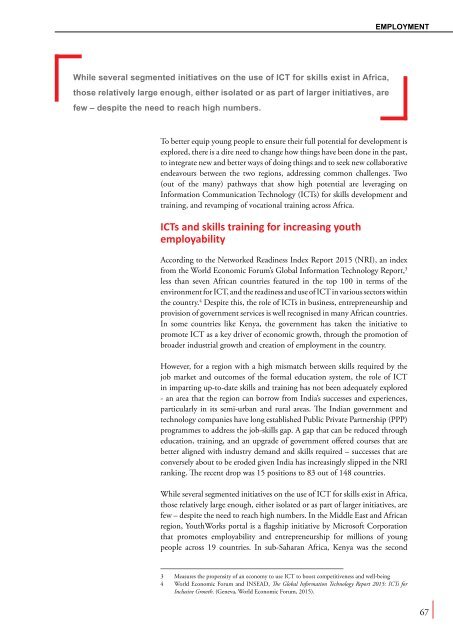Common Futures
II3UUw
II3UUw
Create successful ePaper yourself
Turn your PDF publications into a flip-book with our unique Google optimized e-Paper software.
Employment<br />
While several segmented initiatives on the use of ICT for skills exist in Africa,<br />
those relatively large enough, either isolated or as part of larger initiatives, are<br />
few – despite the need to reach high numbers.<br />
To better equip young people to ensure their full potential for development is<br />
explored, there is a dire need to change how things have been done in the past,<br />
to integrate new and better ways of doing things and to seek new collaborative<br />
endeavours between the two regions, addressing common challenges. Two<br />
(out of the many) pathways that show high potential are leveraging on<br />
Information Communication Technology (ICTs) for skills development and<br />
training, and revamping of vocational training across Africa.<br />
ICTs and skills training for increasing youth<br />
employability<br />
According to the Networked Readiness Index Report 2015 (NRI), an index<br />
from the World Economic Forum’s Global Information Technology Report, 3<br />
less than seven African countries featured in the top 100 in terms of the<br />
environment for ICT, and the readiness and use of ICT in various sectors within<br />
the country. 4 Despite this, the role of ICTs in business, entrepreneurship and<br />
provision of government services is well recognised in many African countries.<br />
In some countries like Kenya, the government has taken the initiative to<br />
promote ICT as a key driver of economic growth, through the promotion of<br />
broader industrial growth and creation of employment in the country.<br />
However, for a region with a high mismatch between skills required by the<br />
job market and outcomes of the formal education system, the role of ICT<br />
in imparting up-to-date skills and training has not been adequately explored<br />
- an area that the region can borrow from India’s successes and experiences,<br />
particularly in its semi-urban and rural areas. The Indian government and<br />
technology companies have long established Public Private Partnership (PPP)<br />
programmes to address the job-skills gap. A gap that can be reduced through<br />
education, training, and an upgrade of government offered courses that are<br />
better aligned with industry demand and skills required – successes that are<br />
conversely about to be eroded given India has increasingly slipped in the NRI<br />
ranking. The recent drop was 15 positions to 83 out of 148 countries.<br />
While several segmented initiatives on the use of ICT for skills exist in Africa,<br />
those relatively large enough, either isolated or as part of larger initiatives, are<br />
few – despite the need to reach high numbers. In the Middle East and African<br />
region, YouthWorks portal is a flagship initiative by Microsoft Corporation<br />
that promotes employability and entrepreneurship for millions of young<br />
people across 19 countries. In sub-Saharan Africa, Kenya was the second<br />
3 Measures the propensity of an economy to use ICT to boost competitiveness and well-being<br />
4 World Economic Forum and INSEAD, The Global Information Technology Report 2015: ICTs for<br />
Inclusive Growth. (Geneva, World Economic Forum, 2015).<br />
67








